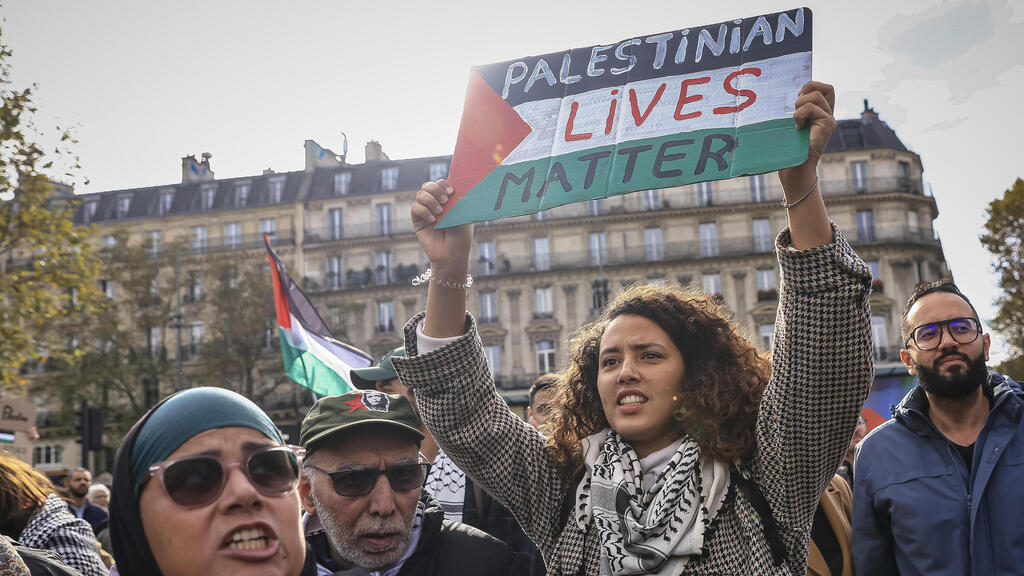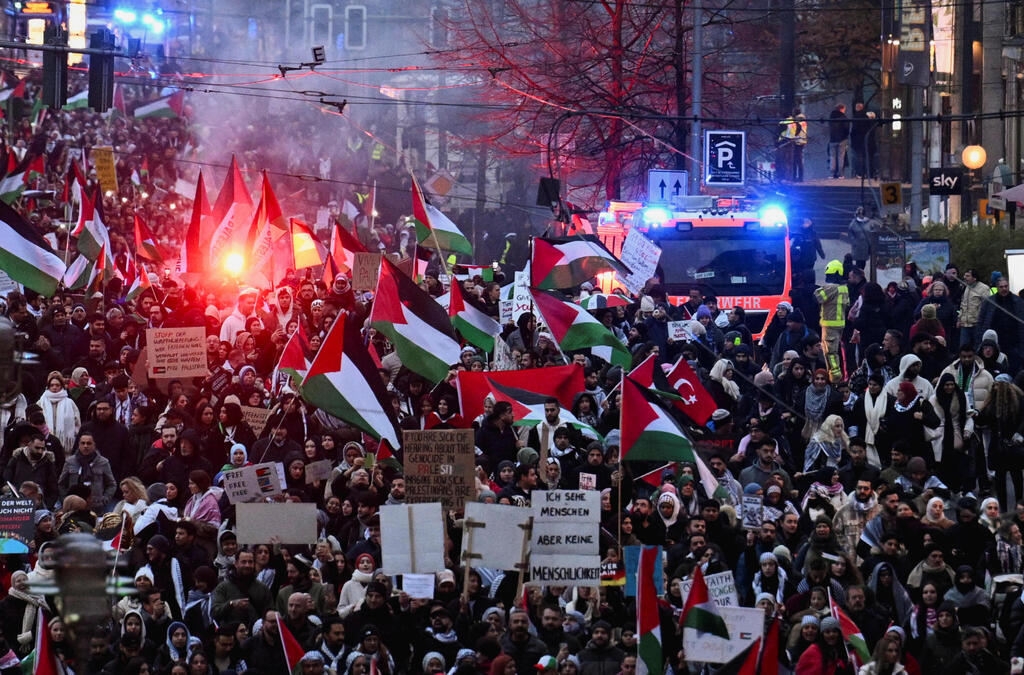Nearly 60 years after the last of the Jews left the Arab countries, warnings are mounting that Jews may, in the foreseeable future, once again be forced to bid farewell to the lands that they have called home for hundreds of years.
More stories:
Decades of relative quiet throughout Europe and the foundation of large (Jewish) communities, especially in France, England, and Germany, seem to have come to an end, and the negative demographic climate—particularly anti-Israel sentiment which is rapidly becoming antisemitic – is growing fast.
6 View gallery
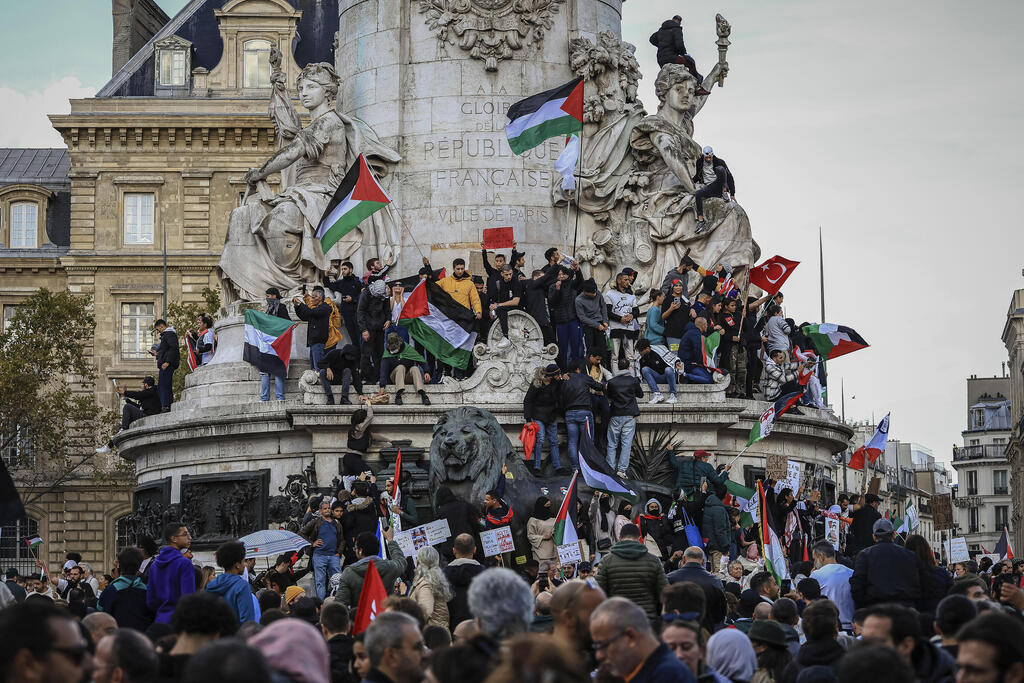

'Conquest' of French monuments by pro-Palestinian protesters
(Photo: AP Photo/Aurelien Morissard)
When Theodor Herzl published his book "The Jewish State" in the late 19th century, 90% of the world's Jews lived in Europe. Even In the years following the Holocaust, European Jews still constituted 35% of world Jewry. Today, only 9% of the world's Jewish population remains on the continent – about 1.2 million – and the trend is apparent.
The most prominent community is in France, with approximately 440,000 Jews, most of whom are concentrated in the large cities. Despite the fact that it is Europe’s largest community, with many institutions and a long tradition as a part of the country, Dr. Dov Maimon, an expert on Europe with the Jewish People Policy Institute, asserts that it (the French Jewish community) is in the gravest danger.
“The situation on the ground speaks for itself. There are ten million Muslims in France, the majority of which are hostile towards Israel and the Jews. Among them are former members of ISIS and radical elements that fester and grow in suburbs that police don’t dare enter. We recently saw a preview of this in the riots that erupted when a young Muslim was killed by the police."
"It wouldn’t have taken much for the multitudes to begin raging in the streets, turn their anger on the Jews, and harm them. Since the beginning of the war, there’s been a dramatic uptick in antisemitic incidents, and there’s no guarantee that these won’t deteriorate into greater violence and danger. The (local Jewish) community has been witnessing this process for many years, already, but it has gained steam since the 7th of October. As of that dreadful day, the number of “Aliya” (immigration to Israel) files opened to emigrate to Israel (from France) has risen by 400%."
On the other hand, it looks like the authorities and the security forces are taking the issue seriously and there was a mass demonstration against antisemitism.
“This is correct, but in practice, of course, it’s impossible to assign a police person to every Jew, every synagogue, or every Kosher restaurant. You can’t protect everything, and truth be told, living with eyes always open and being on constant alert is also exhausting."
"People must also understand that these aren’t always attacks with weapons or physical violence. Take, for example, an incident that occurred last week – a few aggressive types entered a university in Toulouse and simply began questioning each student whether they are for Israel or for Hamas. This kind of act elicits a sense of insecurity and harsh feelings.”
Slowly evolving social exclusion
According to Maimon, one phenomenon that we are seeing in Europe and that further intensifies the desire to emigrate is the slowly advancing social exclusion of Jews. “The Jews are reliving pre-holocaust times when they filled increasingly marginalized positions,” he said.
“They may have private businesses and they are, of course, active within their (Jewish) communities, but they are less and less a part of the overall society and culture. In France, you are asked to leave your personal identity at home, a concept that also comes to bear in the integration of Jews into the public at large."
"They know, for instance, that any expression in favor of or in solidarity with Israel will come with a high and immediate price tag in terms of popularity, or even in a drop in the number of followers on social media. The more prominent, well-known Jews understand, as well, that it’s better to keep a low profile."
"Many have removed their mezuzahs from their exterior doors, others prefer not to receive deliveries to their homes, but to go collect the packages from the post office, and almost all avoid taking Ubers as most of the drivers are Muslims.”
6 View gallery
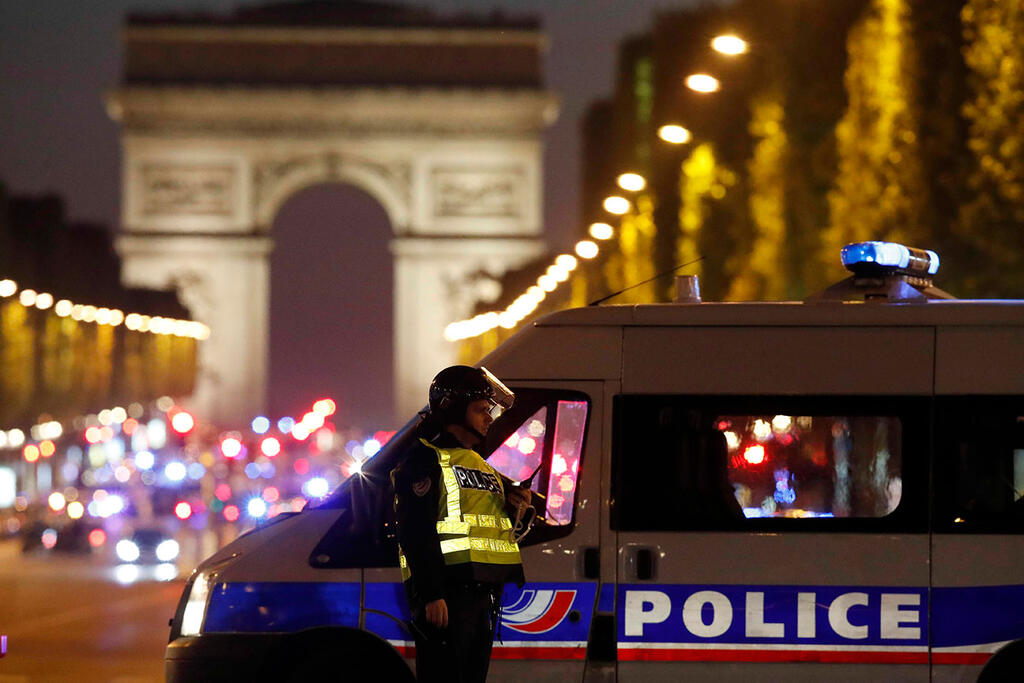

Security forces on the Champs-Élysées. 72% fear an October 7 like terror attack in France
(Photo: Reuters)
What does the average non-Jewish, non-Muslim French person think of all this?
“Supposedly, they don’t care about Israel or the Palestinians, but a survey circulated just after the October 7 attack reveals that 72% of French people fear a similar attack will be carried out in France itself. They vividly remember the slaughter at the Bataclan Club a few years back, where a rock concert turned into a blood bath, and they know it can happen again."
"And there’s another important statistic: A non-trivial percentage of the French police force is of Muslim descent. Will they be able to provide optimal levels of protection when necessary. This is a question that has yet to be answered.”
United Kingdom: A mix of Muslims and anti-Israel local residents
Over the past week, things are beginning to happen in Europe. In Holland, In the Netherlands, Geert Wilders won a majority of the popular vote in the election under the banner of the strategy of "Putting an End to the Immigrant Tsunami," in Ireland, Irish people took to the streets, burning a bus and a building after an Algerian immigrant stabbed a girl, and in France, tempers are flaring after Muslim descent youth stabbed to death a 16-year-old French youth named Thomas, an incident that led to a series of protests with anti-Muslim sentiment bearing the title “Justice for Thomas”.
Clashes between pro-Palestinian protestors and local residents occurred elsewhere, as well. Amongst others, in London. It may be that the Israeli public diplomacy slogan, “The West is next”, is beginning to take hold in the European public, and this, even though most of the public may support, in principle, the Palestinian right to self-determination. They are not comfortable with Islamist marches, Hamas flags, and antisemitic cries on their streets.
With all due respect to this awakening, aren’t the demographics dictating events? In other words, isn’t it a losing battle?
Maimon: “In France, where there are already ten million Arabs as compared to half a million Jews, there is no question that the demographics are having their way. Presently in France, every other newborn is born to at least one parent of immigrant origin, such that the numbers will only continue to climb.”
6 View gallery
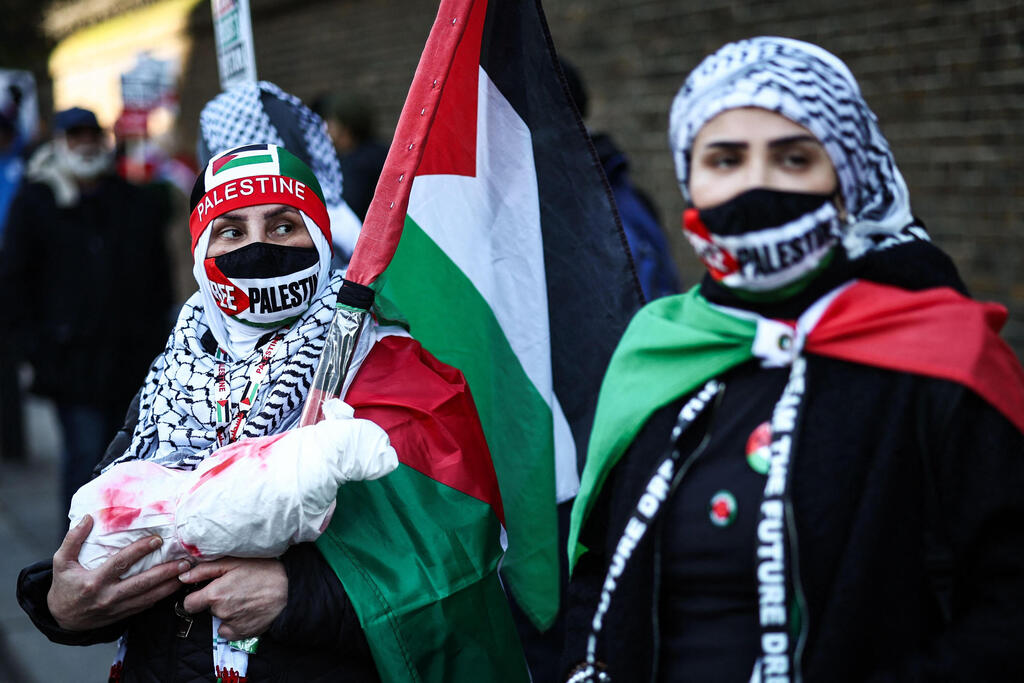

More and more of these kinds of scenes can be seen in the streets of London
(Photo: HENRY NICHOLLS / AFP)
“There are three trends that directly impact European Jewry: The first is the demographic shift that no one has control over, the second is the economic decline – a course of events that never bodes well for sentiment towards Jews, and the third is the uncorking of the antisemitism that had been bottled up for a good number of decades. People are no longer embarrassed of saying “We don’t want Jews here”, and the number of antisemitic acts is on a steep incline.”
“The UK story is complicated. Indeed, the largest anti-Israel protests in Europe took place in the UK, but most of the demonstrators are Muslims that don’t herald from the Arab world, rather, more often from Pakistan, Bangladesh, and other places, and there are less incidents of violence and antisemitism. The authorities’ response was also, relatively speaking, swifter and more severe."
"On the other hand, in the UK, anti-Israel sentiment is also popular among non-Muslim British people, and very quickly, everything gets tangled up into antisemitic sentiment. It isn’t as acute as in France, but also in England, Jews are beginning to play down and conceal symbols of their Judaism in public. They live this harsh reality with a measure of cognitive adaptation that allows them to continue with their day-to-day lives despite the situation.”
Germany: Jews haven’t been assimilated
In Germany, home to 117,000 Jews, the situation is a bit different. A large portion of present-day German Jewry is made up of Soviet Jews who journeyed there because Germany offered them favorable immigration terms. While they came to Germany over the past few decades, they are not “classic” Germans and don’t possess strong ancestral ties to the country. In other words, if the situation deteriorates, it won’t be a big problem for them to emigrate to a different destination.
“At the end of the day, it is safer to go to a synagogue in Jerusalem than in Paris. No Jew in Israel has ever hidden the fact that they are a Jew. There is no Jew in Europe that hasn’t worried about or concealed their Judaism at least a few times in their lives.”
"At the end of the day, it is safer to go to a synagogue in Jerusalem than in Paris."
“The Jews there (in Germany) don’t necessarily feel a part of the German nation. In some respects, they are similar to foreign workers. Many Jews in France will say “I am a French Jew”, and in the UK, Jews will define themselves as Jewish-English, but in Germany they don’t have the same feeling (of identity)."
"Their sense of belonging is not deep-rooted, such that it would be easier for them to tell themselves – our story here is over, it’s time to move on to the next destination. Some have already left or are planning on emigrating to the United States, and there are also those that assimilate, and meld into the German society. It is a different community than those of France and England,” explains Maimon.
Of course, we are especially interested in the Jews, but what about the French, British, German, Belgian and all the other peoples – aren’t they responding to the changes they are seeing in their streets? Are we headed for a cultural war between the West and the Muslim immigrants?
“This is the big question faced by the entirety of Europe. On the one hand, there are political elements, such as Wilders in Holland or Marine Le Pen in France, that speak openly about it. They are leading nationalist lines that call for self-preservation. They feel that their homes are no longer their homes, no longer their countries."
"Conversely, there are elements, particularly in the European left, that deem that no one is going anywhere, and that they must, therefore, form an integrated, multicultural society, because that’s reality. Neither of the cases bodes well for the Jews. Nationalism has never been good for European Jews and if there is a wave of nationalism against immigrants, the repercussions will also be directed against the Jews."
"Equally, A mixed society also isn’t a good solution for them, because integrating the Arabs will require forgoing certain values and there will be some level of Islamization, which definitely won’t be good for the Jews. In other words, we will see either a wave of nationalist, anti-Muslim sentiment with a return to national identities, or heightened Islamization. Both scenarios will push out the Jews.”
So, where will we go?
The obvious solution for the Jews seeking out their future is Israel, but these days of war, and the objective difficulties in general – be it security or be it the internal and economic challenges – don’t make it (Israel) the ultimate, sought after destination.
6 View gallery


A welcoming reception for new immigrants from France. Will we see a wave of immigration after the war?
(Photo: Guy Yehieli)
“Basically, there isn’t really any other destination that can be said to be the right place to go to after they will leave Europe,” explains Maimon. “There is a narrative that says that the entire world is dangerous and it is best, therefore, to stay put in their current locations and wait, in the meanwhile. I contend that despite it all, you are safer in Israel than in Europe."
"While we did endure a horrific event and we are in the middle of a ruthless war, at the end of the day, it is safer to go to a synagogue in Jerusalem than in Paris. No Jew in Israel has ever hidden the fact that they are a Jew. There is no Jew in Europe that hasn’t worried about or concealed their Judaism at least a few times in their lives."
"There is a colossal difference in one’s existential situation. It weighs heavy on one’s spirit to live your entire life in this fashion. I think that, in spite of everything, we will see a wave of aliya (immigration) from Europe after the war, it’s simply inevitable.”
- Article translated by Oren Bar




